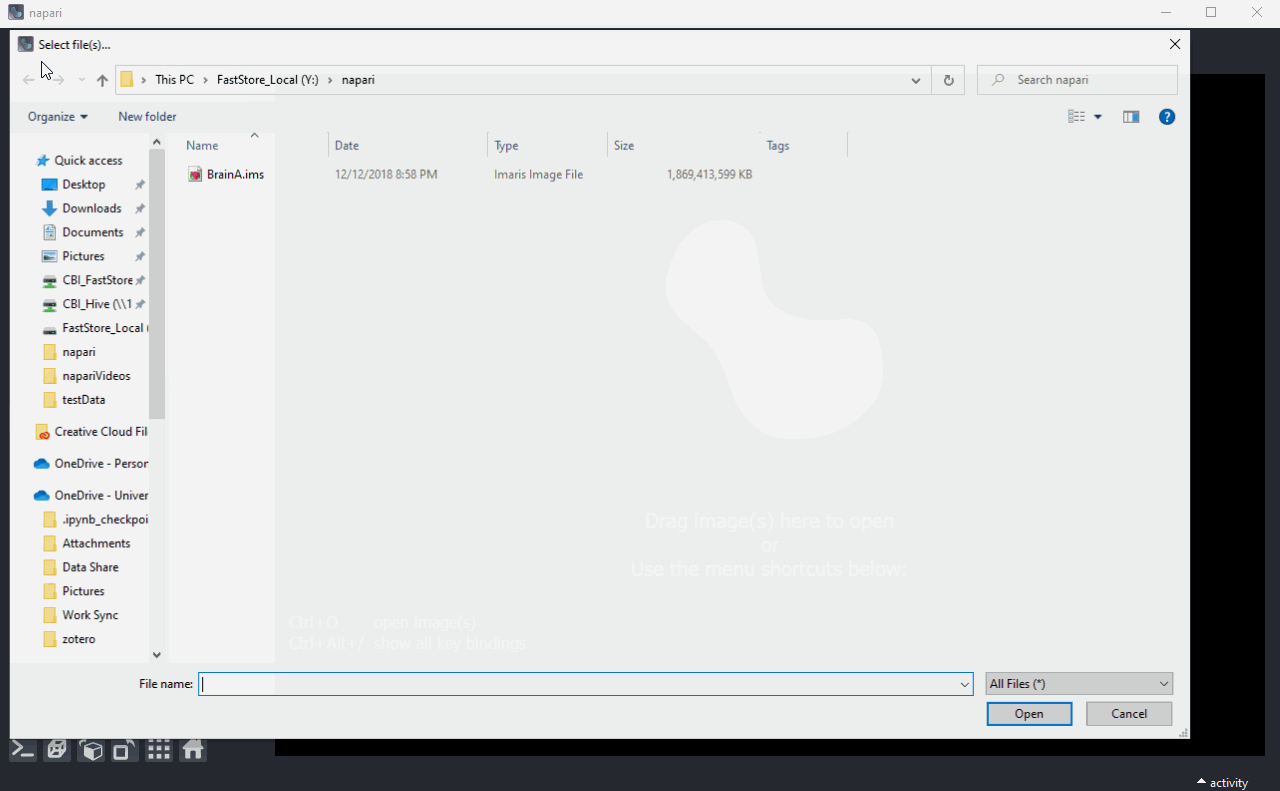Napari plugin for loading Bitplane imaris files '.ims'
Project description
Description
This plugin enables viewing of Bitplane Imaris files, including very large datasets. The GIFs below demonstrate rendering of a ~2TB IMS file containing a 2 color whole mouse brain. The plugin has been tested on datasets as large as 20TB.
NOTE: For this plugin to work "File/Preferences/Experimental/Render Images Asynchronously" must be selected.
Open IMS file:
Render in 3D:
A plugin is provided to dynamically reload the data after selecting the lowest resolution level to be included in the viewer. Since napari only renders the lowest resolution, the user can use this plugin to control the quality of 3D rendering. See features and limitations for tips on suggested usage.
Features
- Multiscale Rendering
- Image pyramids which are present in the native IMS format are automatically added to napari during file loading.
- Chunks are implemented by dask and matched to the chunk sizes stored in each dataset. (Napari appears to only ask for 2D chunks - unclear how helpful this feature is currently)
- Successfully handles multi-terabyte multi-timepoint multi-channel datasets.
- Tested with all sample files provided by Bitplane.
- Higher 3D rendering quality is enabled by a widget that reloads data after specifying the lowest resolution level (higher number = lower resolution) to be included in the multiscale series. Must be done while in 2D rendering mode to avoid crash.
Known Issues / limitations
- Currently, this is only an image loader, and there are no features for loading or viewing objects
- Napari sometimes throws errors indicating that it expected a 3D or 5D array but receives the other.
- This sometimes but relatively rarely causes napari to crash
- Would like to enable Asynchronous Tiling of Images, but this results in more instability and causes crashes.
- Contrast_Limits are currently determined by dtype and not the actual data.
- float: [0,1], uint8: [0,254], uint16: [0,65534]
- Future implementations may use the HistogramMax parameter to determine this.
- 3D rendering works, but it is suggested to turn on 1 channel at a time starting from the highest channel to avoid some OpenGL errors and misalignment errors.
- For example: Turn on only Channel 1, activate 3D rendering, then turn on Channel 0.
- 3D rendering seems to be limited more by computer RAM rather than vRAM.
This napari plugin was generated with Cookiecutter using with @napari's cookiecutter-napari-plugin template.
Installation
You can install napari-imaris-loader via pip:
pip install napari-imaris-loader
Contributing
Contributions are very welcome. Tests can be run with tox, please ensure the coverage at least stays the same before you submit a pull request.
License
Distributed under the terms of the BSD-3 license, "napari-imaris-loader" is free and open source software
Issues
If you encounter any problems, please file an issue along with a detailed description.
Project details
Release history Release notifications | RSS feed
Download files
Download the file for your platform. If you're not sure which to choose, learn more about installing packages.
Source Distribution
Built Distribution
Hashes for napari-imaris-loader-0.1.2.tar.gz
| Algorithm | Hash digest | |
|---|---|---|
| SHA256 | 63f0e30fcb84005cc861b5f020cd31f9ef7890ab10a3e314cea68f96dcb0d44e |
|
| MD5 | f9803ee4d5ad5c922322a7b54c587924 |
|
| BLAKE2b-256 | 732028812505174ba7c76aa2e70cba113c66dfba5b41ae1580db9a865d29368e |
Hashes for napari_imaris_loader-0.1.2-py3-none-any.whl
| Algorithm | Hash digest | |
|---|---|---|
| SHA256 | b95c5ee414664c98427faf07878bd0b0b92e3ca7f2e2f8cb01ec4dc08bf5db60 |
|
| MD5 | 86a472af8eb1cfb0498a6fa5a0cfe72d |
|
| BLAKE2b-256 | 8925cbf638e22a1c822118eb9f2009df426d7d4f387d491bf9b4951f925c3d6f |













